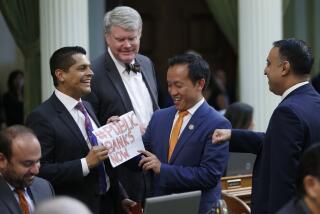Ports Used Far East Bank for Non-Interest Account
- Share via
An independent authority set up by the ports of Los Angeles and Long Beach has held a non-interest-bearing checking account with Far East National Bank since 1984, according to documents released Tuesday by the Los Angeles Harbor Department.
The two ports deposited a total of $5 million in the account during 1984 and 1985 toward construction of a $62-million facility to transfer cargo containers from ships to rail cars. The 150-acre Wilmington facility, operated by Southern Pacific Transportation Co., opened in December, 1986.
City accounts with Far East National Bank have come under scrutiny in recent months because of Mayor Tom Bradley’s ties to the bank. The city attorney’s office is investigating Bradley’s financial affairs, including his relationship with Far East. The bank paid Bradley $18,000 last year to serve as the only paid member of its advisory board. Bradley has since resigned from the board and returned the money.
He has said he did not know when he was on the bank’s advisory board that Far East was doing business with the city. Besides the harbor account, Far East has had deposits from the city treasurer’s office and the Community Redevelopment Agency.
$200,000 Balances
During the first eight months of 1985, the harbor account had daily balances of at least $200,000, according to bank statements. The balance dropped dramatically after construction was completed in late 1986, port officials said. The account’s current balance is about $6,000, they said.
The documents were requested by The Times as part of its review of Far East’s dealings with city agencies. They show no connection between Bradley and the authority’s decision in October, 1984, to open the account with Far East.
Bradley spokesman Bill Chandler, after reviewing the documents, said the authority was acting as an independent agency. “It appears it was simply a joint powers agreement between the city of Long Beach and an independent city department,” Chandler said. “There is no indication at any point that the mayor’s office was involved or consulted.” The Intermodal Container Transfer Facility Joint Powers Authority selected Far East as its bank just two months after the authority’s project manager had recommended Sumitomo Bank.
The manager and authority board members changed their minds after then-Los Angeles Harbor Commissioner Dominick Rubalcava complained that they had not considered opening the account with minority-owned banks. The board consists of the executive director of each port and one member from each port’s commission.
Harbor Department officials said Rubalcava, appointed to the commission by Bradley, had long advocated more dealings with minority-owned businesses. Sumitomo is not on the city’s list of minority-owned banks. Rubalcava, an attorney, since has resigned from the Harbor Commission and was named to the Recreation and Parks Commission.
A report prepared in October, 1984, for the authority’s governing board said that Far East was selected over Sumitomo because it would provide wire transfers and bank credit cards at no cost. Both banks had agreed to provide basic banking services free of charge, but the report said Sumitomo Bank “indicated that there would be a small charge for these additional services.”
Arthur B. Goodwin, project manager for the authority, said in an interview Tuesday that the authority decided to go with Far East in part because it was minority owned. He said he did not know why the authority did not request an interest-bearing account. But he said the question of interest payments was not important because money deposited in the account by the ports was moved in and out quickly to cover expenses.
‘It Was a Non-Issue’
“There was never money deposited into the account until there was a legitimate expense that we knew was due and payable,” Goodwin said. “I don’t recall any real discussion of an interest-bearing account. It was a non-issue.”
The letter sent by the authority to various banks seeking proposals for banking services said the banks should be able to invest “surplus cash as may be directed by the authority.” The proposal submitted by Far East stated that the bank was prepared to make such investments on behalf of the authority, but the bank statements for 1984 and 1985 do not show that the authority ever requested investments. However, a letter released by the department shows that in January, 1986, the authority instructed the bank to invest $150,000 for 90 days.
More to Read
Sign up for Essential California
The most important California stories and recommendations in your inbox every morning.
You may occasionally receive promotional content from the Los Angeles Times.













